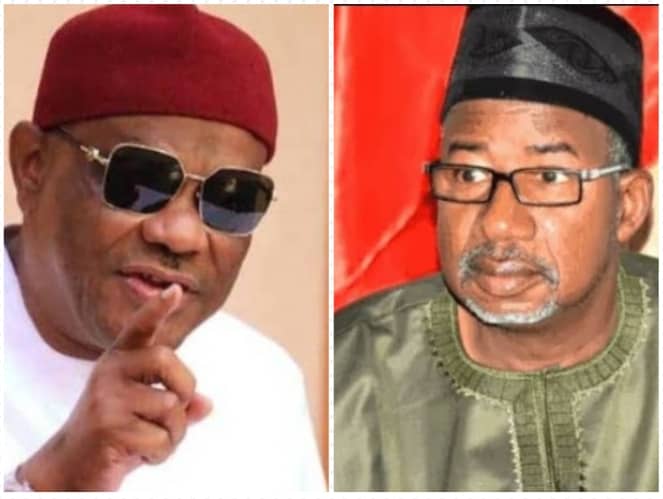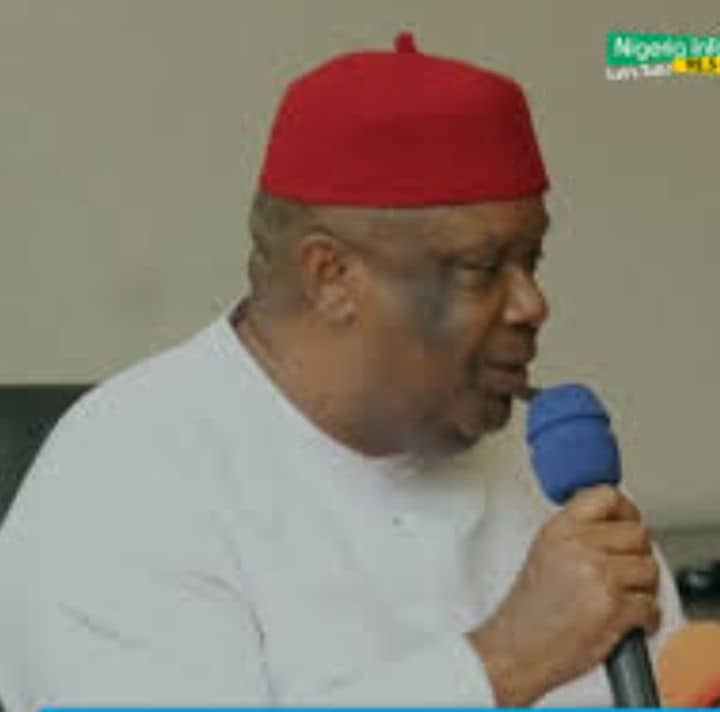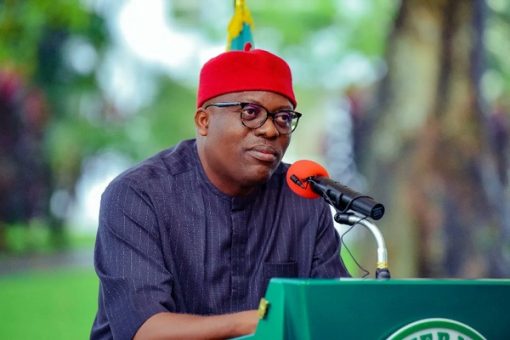Exposed: How Wike Bankrolled Bala Mohammed’s Gubernatorial Victory—Dogara Drops Bombshell!
ABUJA, Nigeria — In the intricate tapestry of Nigerian politics, alliances are often as transient as the morning dew, evaporating under the heat of ambition and shifting loyalties. A recent revelation by former Speaker of the House of Representatives, Yakubu Dogara, has cast a glaring spotlight on the tumultuous relationship between Bauchi State Governor Bala Mohammed and the Minister of the Federal Capital Territory, Nyesom Wike.
Dogara’s detailed account not only underscores the fragility of political friendships but also exposes the deep-seated tensions that can arise from perceived ingratitude and betrayal.
The Genesis of an Alliance
In 2018, as the political landscape of Bauchi State was poised for a significant shift, the People’s Democratic Party (PDP) faced a formidable challenge. Senator Abdul Ningi, a dominant figure within the state, had established a robust party structure, positioning himself as the frontrunner for the gubernatorial ticket.
Amidst this backdrop, Bala Mohammed’s aspirations appeared tenuous. Recognising the uphill battle, Yakubu Dogara sought external support to bolster Mohammed’s candidacy. He turned to Nyesom Wike, then the influential Governor of Rivers State, renowned for his political acumen and deep pockets.
Dogara recounted his plea to Wike, emphasising the uncertainty surrounding Mohammed’s prospects. Wike’s response was both strategic and decisive. He appointed his close ally, Chief Dan Osi Orbih, as the chairman of the primary election panel, ensuring that the process would be overseen by a trusted confidant. This move was pivotal in navigating the complex dynamics of the PDP primaries in Bauchi State.
The Financial Quagmire
Emerging victorious in the primaries was only the first hurdle. The subsequent realisation was stark: Bala Mohammed lacked the financial resources to mount a formidable general election campaign. This revelation was unexpected, especially considering Mohammed’s tenure as a former minister.
A fundraiser was organised at the Lady Kwai Hall, Sheraton Hotels in Abuja, incurring an expense of N20 million. The outcome was disheartening, with only N48 million raised, barely covering the event’s costs and leaving a meagre surplus for the campaign.
Faced with this financial shortfall, Dogara once again sought Wike’s assistance. Accompanied by two serving senators, Dogara and Mohammed travelled to Port Harcourt without prior notification to Wike. Upon their arrival, Wike’s initial reaction was one of surprise and coldness, stemming from past grievances during their ministerial tenures.
Wike recounted instances where Mohammed had allegedly sidelined him, including denying him land allocations and subjecting him to prolonged waiting periods for approvals.
A Humbling Encounter
Despite the strained history, the meeting took a conciliatory turn. Confronted with these past grievances, Mohammed admitted his faults and pleaded for forgiveness, assuring Wike of his transformation. Moved by this gesture and adhering to his principle of supporting a brother in need, Wike extended substantial financial assistance to Mohammed’s campaign.
He not only provided funds but also offered a private jet to facilitate their return to Abuja, underscoring the depth of his support.
The Unraveling of Ties
Fast forward to recent events, the camaraderie between Mohammed and Wike has deteriorated into public spats and mutual recriminations. Mohammed has labelled Wike a “transactional politician,” accusing him of betraying benefactors and shifting loyalties for personal gain.
In response, Wike’s camp has criticised Mohammed’s opposition to President Bola Tinubu’s tax reform bills, describing his stance as misplaced.
Dogara’s intervention seeks to highlight what he perceives as Mohammed’s ingratitude. He questions the moral compass of a man who, having once knelt in supplication for support, now turns against his benefactor.
Dogara’s narrative paints a picture of political treachery, where past favours are conveniently forgotten in the pursuit of current ambitions.
Broader Implications
This feud transcends personal animosities, reflecting deeper fissures within the PDP. The party, already grappling with internal crises, faces further challenges as key figures engage in public confrontations.
The discord between Mohammed and Wike threatens to destabilise party cohesion, especially with the upcoming National Executive Committee meeting on the horizon.
Moreover, this episode underscores the volatile nature of political alliances in Nigeria. It serves as a stark reminder of the ephemeral nature of political friendships, where today’s ally can become tomorrow’s adversary. The narrative also highlights the role of personal grievances and past slights in shaping current political dynamics.
The Road Ahead
The unfolding drama between Bala Mohammed and Nyesom Wike offers a window into the complex interplay of loyalty, ambition, and memory in Nigerian politics. As the PDP navigates these turbulent waters, the party’s ability to manage internal dissent and reconcile warring factions will be crucial in determining its future trajectory.
For the key actors involved, this episode serves as a poignant reminder of the enduring impact of past actions and the importance of gratitude in political relationships.
In the end, the political landscape is ever-shifting, and today’s narratives will inevitably influence tomorrow’s realities. The lessons from this saga are clear: in politics, as in life, relationships are built on trust, respect, and a recognition of past sacrifices. Neglecting these foundational principles can lead to the unraveling of even the most formidable alliances.
Former Nigeria House Speaker Yakubu Dogara exposes how Nyesom Wike funded Bala Mohammed’s campaign, calling out the Bauchi Governor’s ingratitude in a shocking political betrayal.
The Fallout: A Fractured Political Landscape
As the embers of this political revelation smoulder, the PDP is left to grapple with the repercussions of a feud that threatens its internal stability. Bala Mohammed and Nyesom Wike, once political allies bound by necessity, now stand as adversaries in a game of power and influence.
For Mohammed, the allegations of ingratitude are a damning indictment of his political ethos. Dogara’s revelations paint a picture of a politician who, in his desperate hour, sought and received aid but, in the aftermath of victory, chose to sever ties with his benefactor.
For Wike, this exposé reinforces his reputation as a kingmaker, a man whose political reach extends beyond the borders of Rivers State. However, it also casts a shadow on his judgment—was his support for Bala Mohammed a miscalculation? Did he unknowingly empower a future opponent?
A Party on the Brink of Implosion?
The PDP has long struggled with internal discord, but the Mohammed-Wike feud adds another layer of complexity. With the party still reeling from the 2023 general elections and facing an existential battle against the ruling All Progressives Congress (APC), unity should be paramount. Instead, key figures are engaged in public warfare, weakening the party’s collective strength.
Dogara’s revelations could have ripple effects beyond Bauchi and Rivers States. If party members begin taking sides, PDP risks further fragmentation ahead of the next general elections.
Moreover, Mohammed’s political future is now under scrutiny. Having alienated Wike, he may find himself politically isolated. Will other power players within the PDP distance themselves, fearing a similar fate?
Meanwhile, Wike, now serving as FCT Minister under the APC government, is increasingly perceived as a wildcard—an opposition figure working within the ruling party. His ability to manoeuvre through this complex dynamic will determine his future influence in national politics.
The Broader Implications for Nigerian Politics
This episode underscores a fundamental reality of Nigerian politics: alliances are transactional, and loyalty is often a fleeting concept. The idea of political gratitude is overshadowed by the pursuit of power, and today’s ally can swiftly become tomorrow’s adversary.
As the dust settles, one question remains—who truly benefits from this exposure? Is it Wike, who now stands vindicated? Or is it Dogara, who has positioned himself as a guardian of political morality?
One thing is certain: this saga is far from over. With the 2027 elections on the horizon and the PDP’s internal battles intensifying, this revelation could be the first domino in a series of political reckonings.




